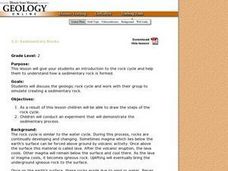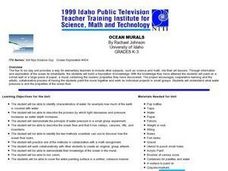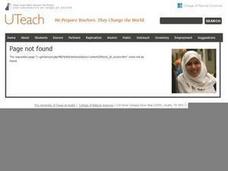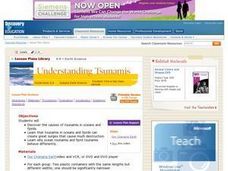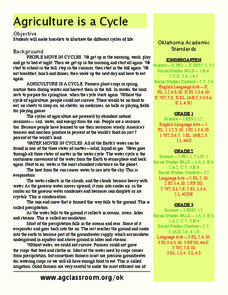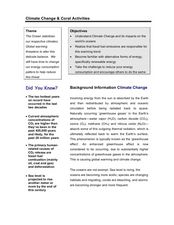Curated OER
2.2: Sedimentary Rocks
Second graders discuss the geologic rock cycle and work with their group to simulate creating a sedimentary rock. They conduct an experiment that demonstrates the sedimentary process and draw the steps of the rock cycle.
Curated OER
Environment: Rivers of Destiny
Students investigate the results of human intervention with the Mekong. Mississippi, and Amazon rivers. After watching a video about the status of the three rivers, they complete experiments demonstrating the effects of erosion and...
Curated OER
Aquifer Model
Students, after researching and brainstorming about aquifers and locating aquifer maps of Texas, participate in the building of a model of an aquifer complete with a pumping station. They also answer a variety of questions at the...
Curated OER
Now You See It, Now You Don't
Students explore organic and inorganic objects. In this environmental lesson students perform a composting experiment using flowers in different soils. Students record their observations.
Curated OER
The Water Cycle
Third graders investigate water formations by conducting an experiment. In this water properties lesson, 3rd graders utilize pie tins, sponges and salt shakers to create an evaporation and saturation experiment. Students collaborate in...
Curated OER
The Climate Change Skeptic's Argument: Natural Solar Cycles or Human Activity?
Teachers explore patterns in sunspots and total solar irradiance to understand the counterpoint to the human effect of global warming. In this professional development tool, teachers work through a lesson on the sun's natural patterns to...
Curated OER
The Discovery of Photosynthesis
Young scholars explore how scientists discover photosynthesis. In this biology lesson plan, students identify the basic requirements for photosynthesis to happen. They recreate past scientists' experiments and record their observations.
Curated OER
Rover Races
Students identify the challenges encountered by astronauts in operating a planetary rover. In this space science lesson plan, students create a rover using their team members. They follow a command sequence from the driver and navigate...
Curated OER
Ocean Murals
Students identify characteristics of water. They describe the process by which light decreases and pressure increases as water depth increases. They demonstrate the principle of water pressure in a small group experiment.
Curated OER
TE Activity: Super Spinners!
Young scholars make spinners to investigate rotational inertia, rotational speed, angular momentum, and velocity. They make two sets of spinners that have different mass distributions and shapes. They complete a worksheet while...
Curated OER
To Drink or Not to Drink?
Second graders compare water conservation issues as they impact the past, present, and future in Nevada. For this water conservation lesson, 2nd graders perform and ice experiment to comprehend water collection differences. Students...
Curated OER
Weathering and Erosion
Students conduct two experiments. In this weathering and erosion lesson, students identify the different ways that weathering occurs, name the natural elements of weather and explain the process of erosion. Students watch a PowerPoint on...
Curated OER
Heat Absorption and Radiation
Learners experiment with the concepts of absorption and reflection of radiant energy.
Curated OER
Effects of Ozone in the Air
Fifth graders, in groups, conduct an experiment in which they measure ground level ozone levels using an ozone measuring kit. They analyze and compare the weather conditions and locations where ozone readings are highest and lowest.
Curated OER
As the Sun Burns
Learners investigate the sun's energy. They explore various websites, demonstrate proper solar protection, conduct experiments using special UV beads, and complete worksheets.
Curated OER
Understanding Tsunamis
Students discover the causes of tsunamis in oceans and fjords. They perform an experiment to discover how calving icebergs can create different wave patterns in the ocean and in a fjord. In addition, they draw a diagram to illustrate the...
Curated OER
Magnets
In this magnets worksheet, students read for information, observe diagrams, and experiment. In this identifying the correct answer and T-Chart worksheet, students answer nine questions.
Curated OER
The Amazing Apple
Students analyze an apple. In this lesson about developing inquiry skills, students do an experiment with an apple. Students make several observations about the apple. Students answer questions to help them improve and practice their...
Curated OER
Oil Changes Everything
Young scholars participate in a hands on activity simulating an oil spill. In this oil spill lesson plan, students conduct an experiment about an oil spill, discuss how it would affect the environment and provide solutions to prevent oil...
Curated OER
Pump It Up
Students use water in a flask to simulate how oil is pumped or forced out of the Earth by pressure from natural gas or human machinery. In this oil lesson plan, students complete a lab packet and work in groups.
Curated OER
Exploring for Petroleum - Modeling an Oil Reserve
Students experiment with locating oil reserves. In this conservation lesson, students use a cardboard box to create sand, rocks, and an oil reserve (water balloon). They use a probe to dig around in the box to find the oil reserve and...
Curated OER
Modeling an Oil Reserve
Young scholars conduct an experiment. In this oil and natural gas instructional activity, students learn how geoscientists identify and explore reserves of petroleum. Young scholars make a model of an oil reserve, record how much it...
Curated OER
Agriculture is a Cycle
Students explore cycles in nature. In this cross curriculum agriculture lesson, students define "cycle" and research weather and planting folklore. Students make a bracelet in which individual colored beads represent the many "cycles" of...
Curated OER
Climate Change & Coral Activities
Students study how the ocean stabilizes our planet's climates and how global warming is becoming a threat to this fine balance. In this climate change instructional activity, students identify that fossil fuel emissions are responsible...


